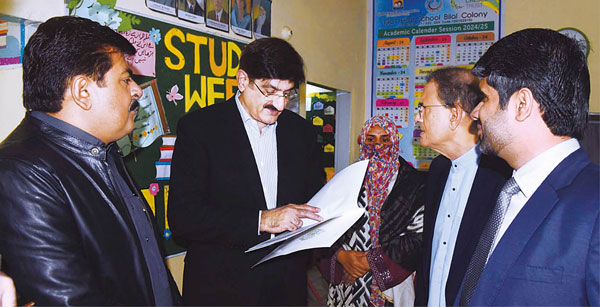Sindh Chief Minister Syed Murad Ali Shah on Monday commended the collaboration between non-profit organizations and the government in enhancing education for children from underserved communities through modern digital learning tools.
The remarks came during his visits to schools run by NGOs in Korangi in partnership with the Sindh Education Foundation.
Shah first visited the Green Crescent Trust school in Bilal Colony, which serves 559 children from low-income families, offering classes up to grade eight and preschool education. GCT principal Irum Fatima shared the challenges of high demand, with over 1,000 eligible children unable to enroll due to limited capacity. The Chief Minister assured support for expansion and instructed Education Minister Syed Sardar Shah to conduct regular inspections of SEF-affiliated schools.
The GCT has been a key player in enrolling out-of-school children for 30 years, operating 170 charitable schools across Sindh. Of these, 19 schools, including 12 in Karachi, are affiliated with the SEF, collectively educating over 32,800 students.
CM Shah also toured the Digital Micro School in Awami Colony, where 100 students use tablets for interactive learning in subjects like English and Mathematics. Praising the innovative approach, the Chief Minister expressed interest in replicating such models across other schools, provided the outcomes remain promising.
He interacted with families of enrolled children, most of whom are laborers, and stressed the importance of education in improving living standards. Later at a meeting on Monday, Murad Shah highlighted the need to reduce the 46% dropout rate among students completing primary education due to the lack of middle schools.
He directed the education department to start middle school classes in the afternoon shifts at primary schools.
Minister of Education Syed Sardar Shah outlined plans to upgrade 2,000 schools over the next three years. He revealed that 4,039 out of 19,808 flood-damaged schools are under reconstruction with a Rs. 116 billion budget, aiming to restore 40% of affected enrolments. Additionally, the Chief Minister approved converting the School Infrastructure Development Project into a company for better efficiency in maintenance and resource procurement.










